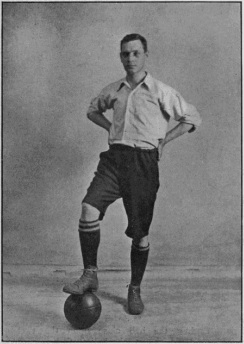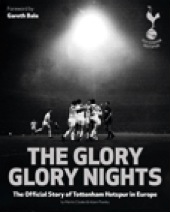 It’s often been said that Spurs are most successful when there is a Scotsman centrally involved, and over the years some of Scotland’s finest players have worn the famous lilywhite shirt. The first of Tottenham’s flying Scotsman was John Cameron. Born in Ayr, Cameron played for the famous Scottish amateur side Queens park before moving to Everton, where he played as a centre-forward before moving to the inside-forward’s slot. In 1898, Everton placed him on the transfer list, a move thought to have been influenced by Cameron’s activity as secretary of the newly-formed players’ union. The men who made Spurs The latest in Martin Cloake’s series about some of the key figures who made the club what it is. Spurs manager Frank Brettell had been after Cameron for some time, and his faith was rewarded when the player scored 35 goals in his first season, helping Spurs to third place in all three leagues they played in, and past the qualifying rounds of the FA Cup for the first time. Cameron was not only a prolific goalscorer, but also a pacey and intelligent forward with good technical skills, able to dribble or to hold up the ball well, and he had a fine eye for a pass. He was also a very articulate man and in 1899, at the age of just 26, he was appointed player-manager-secretary when Brettell left. He set about assembling the first great Spurs team. Top quality players such as George Clawley, John Kirwan, David Copelamnd and Sandy Tait were recruited and the attacking, passing style that was to become indelibly associated with Spurs began to emerge. Cameron’s team won the Southern League in his first full season in charge, the club’s first major success and the achievement that earned uit the nickname “the Flower of the South”. The next year, Cameron recruited fellow Ayr man Sandy Brown to replace top scorer Tom Pratt after Pratt announced his intention to return to Preston. Brown was a goalscoring phenomenon, scoring in every round of the FA Cup run that took Spurs to the 1901 final. The replay of that final at Bolton’s Burnden Park saw Cameron deploy his tactical nous to full effect. In the first half, Spurs dominated but to no effect. At half time, Cameron changed the tactics, moving John Kirwan and Tom Smith in from the wings to support the inside forwards. Within 10 minutes it paid off. Cameron scored the equaliser, then fired in the shot that United goalkeeper Bill “Fatty” Foulkes could only parry into the path of Tom Smith, who slotted home. It fell to Brown to score the third and win the cup for Spurs. That victory sent shock waves through English football. An amateur side from the south had beaten a professional giant from the north and things would never be the same again. Spurs were heroes, and remain the only non-league side to win the FA Cup. During his playing career, Cameron scored 139 goals in 293 appearances. But he was as influential off the pitch as on it. Not only did Cameron involve himself in every aspect of running the club, from organising matches to selling tickets, he also wrote regularly for the football press and was called upon for comment on the football issues of the day. For the next five years he kept Spurs up with the top clubs in the Southern League, all the while insisting that the team played entertaining, attractive football. It was Cameron who established the personality of the club, and in Cameron’s ideas about the way football should be played we can clearly see the seeds of the approach that led to the successes of Arthur Rowe, Bill Nicholson and Keith Burkinshaw. In 1907, Cameron announced this resignation, citing “differences with the directorate” as the reason for his decision. It would not be the last time the club’s directors were responsible for driving out a loyal and successful club servant. Cameron continued to produce journalism about football, and in 1908 wrote the first history of Tottenham Hotspur, called The White Hart’s History of the Spurs Entry to the Football League. He went to Germany to coach Dresdner FC and, when war broke out in 1914, he was interned in Ruhleben civic detention camp in Berlin along with 5,000 other prisoners. As the war went on, the prisoners began to organise themselves and sport became a popular pastime. Cameron became secretary of the Ruhleben Football Association, whose matches were sometimes watched by up to 1,000 people, and a member of the Ruhleben Tennis Association. In May 1915, he captained a World XI against an England XI at the camp. After the war he briefly managed Ayr United before returning to football journalism. He died in Glasgow in 1935, aged 63. About the Author: Martin Cloake is a writer and editor who lives in London, UK. A Spurs season ticket holder, he has followed the team since 1970, travelling all over the UK and Europe to support them. His latest book, Sound of the crowd, is a look at changing fan culture in England with an emphasis on Spurs supporters. He is a regular contributor to Spurs fansites and podcasts. He also writes more widely on football and the football business for a variety of publications including the New Statesman. Martin Cloake’s books about Tottenham Hotspur, including ebooks that can be downloaded directly to your computer or mobile device, can be ordered from his bookstore. View Full Bio Follow @MartinCloake More by Martin Cloake Comments Below
1 Comment
parth
8/11/2013 05:25:29 pm
this is an excellent series! getting to know loads about the club. keep it going. COYS!
Reply
Leave a Reply. |
Features
Flying Down to Rio History of T.H.F.C. Tribute to Bill Nicholson Talking Tottenham Early Legends The Road to Turin International Connections Hotspur Towers Most Read Articles
The 100 Year War Interview with Marina Sirtis A Long Dark Shadow By Royal Appointment School Report: An Insight into the Younger Eric Dier Dear Jimmy All Change At Spurs Hotspur Towers History Of THFC: Part 1 Passage to India: Rohan Rickets Thanks For The Memories Our Tommy Carroll The AVB Files: Part1 The Lilywhites You The Jury The Hand Of Hugo Connection - Argentina Creating a Reputation One Hotspur Archives
August 2018
Categories
All
|
 RSS Feed
RSS Feed

